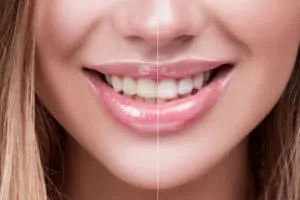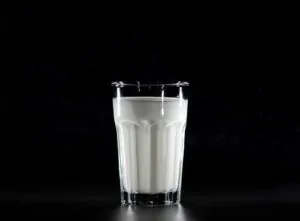General Dentistry

The Truth About Smile Whitening Treatments
Smile whitening is probably the most popular form of cosmetic dentistry done today. However, what was once only available at the dentist can now be done at home without any exam or assurance that the teeth are healthy enough. Additionally, even though over-the-counter whitening treatments can make it easier for people to whiten their teeth, it’s become increasingly popular and has created almost a whitening addiction. Both of which can cause some serious problems.
More Whitening, More Problems
Now, we should note that smile whitening can be done safely. However, there are issues when someone whose teeth aren’t healthy, or who thinks “the more whitening, the better” whitens their teeth that can cause things to take a turn for the worse.
Over-bleaching your teeth can wear down tooth enamel. Without this protective layer, teeth are put at increased risk for decay, cavities, and sensitivity. Additionally, if your teeth aren’t healthy to begin with, and let’s say you have a cavity, introducing bleaching ingredients can cause uncomfortable zings of pain through your teeth. And the problems don’t end there.
Many over-the-counter whitening treatments allow too much of the bleach to touch and sit on the gums which can cause gum irritation, sometimes severe. Lastly, too much whitening can actually make your teeth appear more translucent and darker in appearance, which is the opposite of what you want.
Safely Whiten Your Smile
The best way to get a whiter smile is to first start by talking to your dentist in Sparks. Not only can they help you find the best smile whitening treatment for you, but they can also help you find the best shade of white for your teeth for an overall natural, yet enhanced, look. Whichever smile whitening treatment you agree on, make sure you follow the directions to a “T,” especially if you’re going to use a take-home whitening product. Don’t leave the whitening gel on longer than recommended, and stop use if irritation or sensitivity occurs.
Even though smile whitening treatments can be found at any grocery store or even ordered online… it doesn’t mean that all of them are created equally. Make sure you do your own research, talk with your dentist in Sparks, and don’t overdo it.

Germs & Bacteria
We all know that germs can be passed from one person to another through kissing, but they aren’t the only things being swapped. When it comes to kissing, your dentist in Sparks is also concerned with the sharing of bacteria. You see, certain types of bacteria have been known to increase the risk of tooth decay and cavities. Now, while our mouths are naturally packed with bacteria, when we kiss, these bacteria (both good and bad) can easily transfer from person to person and introduce cavity-causing bacteria.
Keep Your Bacteria to Yourself
Even though kissing comes with some potential negatives, we’re certainly not recommending that you stop altogether. Instead, your dentist in Sparks has a few tips you can try in order to keep both you and your partner smooching safely.
- Breath Test
Nobody wants to kiss someone who has bad breath, and now we’re going to give you yet another reason to tread carefully when you encounter someone with chronically bad breath. Bad breath may be a sign of gum disease, which itself is caused by an overload of bacteria and an infection in the gum tissue.
- Oral Hygiene
Even though our mouths naturally contain tons of bacteria, you should always brush and floss regularly in order to keep bacteria levels in check. Also, it’s key that you see your dentist in Sparks at least every six months for professional cleanings to further protect your teeth.
- Drink Water
When you’re not able to brush your teeth try to drink or even rinse your mouth with water. This can also help remove bacteria buildup. You can also chew Xylitol gum to help reduce bacteria levels and give your breath a fresh boost for all those kissable moments. Plus, Xylitol can keep bacteria from sticking to your teeth and creates a neutral pH level in your mouth for even more protection.
Some Good News
It’s important to note that there are certainly some positives to kissing, some of which we mentioned earlier. As it relates to your oral health, kissing can actually help good bacteria move from person to person and increases your saliva production. Saliva is your mouth’s natural way of washing away bacteria and neutralizing acid, both of which help protect your teeth against decay.
When it comes to kissing, there are more positives than negatives. Just make sure you practice good oral hygiene habits so your breath is kissable fresh every single time you pucker up.

National Alzheimer’s Disease Month
Alzheimer’s Disease is a form of dementia that affects more than 5 million Americans, and every November we recognize National Alzheimer’s Disease Month in honor of these patients. Until recently, research regarding what causes Alzheimer’s has been limited, which can be frustrating to patients, families, and doctors alike. But thanks to this research, we may be closer to identifying a cause than ever before.
Gum Disease & Bacteria
Our mouths contain hundreds of different types of bacteria. Some of these bacteria are good and others are bad. The bad bacteria are what concern your dentist in Sparks as well as Alzheimer’s researchers. One of these bad bacteria, known as Porphyromonas gingivalis, is at the forefront of the study conducted by the National Institute on Aging. This bacteria, which was found as the leading cause of gum disease in over 6,000 participants, may produce something called plaque of beta-amyloid proteins. Why does this matter? Plaque of beta-amyloid proteins is one of the key indicators of Alzheimer’s Disease.
In yet another study published in the Journal of Alzheimer’s Disease, researchers looked at brain tissue from both patients with Alzheimer’s and patients without. What did they find? Interestingly, the brain tissue from dementia patients contained gum disease bacteria, while brain tissue from non-dementia patients did not.
Even though these studies seem promising and may bring us closer to finding a cause and a cure for Alzheimer’s, we need to note that additional research is still needed.
Protect Your Gums
Whether or not gum disease causes Alzheimer’s or not, it’s still important to protect your gums against disease. Untreated gum disease can lead to tooth loss or bad breath, and the infection can enter the bloodstream and begin to affect other areas of the body, including the heart and perhaps the brain. The best ways to protect your gums include:
- Brushing and flossing every day
- Avoiding tobacco
- Seeing your dentist in Sparks twice a year
Bi-annual visits to your dentist help remove plaque buildup in your mouth that at-home brushing alone can’t touch. This further protects your teeth against cavities and your gums against disease. If it’s been longer than six months since you’ve seen a dentist, schedule an appointment today.

An Important Note About Facemasks
Before we go any farther, we want to be clear that we are not suggesting that you stop wearing a mask, as the potential benefits outweigh the risks. What we are recommending is that you become aware of how your facemask can play a role in your oral health and learn what you can do to help.
Mouth Breathing
While the mask itself isn’t causing cavities, the changes we experience as a result of wearing them can. For example, most of us are not used to wearing a facemask at all let alone daily or perhaps all day every day. Because of this new factor, many people may begin to breathe out of their mouths instead of their noses because it’s more comfortable. However, this change in breathing is what can cause concerns for your dentist in Sparks.
When we breathe out of our mouths, whether because of a facemask or not, it can quickly dry out saliva production and create dry mouth. Dry mouth is concerning because a mouth needs saliva to help wash away things like bacteria and neutralize acids. Without it, teeth are at increased risk for tooth decay and other intraoral problems.
Bad Breath
Besides an increased risk of decay, mouth breathing can also cause bad breath. Since there’s not enough saliva around to wash away bacteria, they’re left free to feed on leftover food particles. As a result, these bacteria release a stinky byproduct.
Avoid Dry Mouth
Now, even though your dentist in Sparks knows that mouth breathing and dry mouth aren’t great for oral health, there are things you can do to help avoid dry mouth or treat it if it does occur such as:
- Drink plenty of water throughout the day. This will help keep the mouth hydrated and moist.
- Suck on sugar-free hard candies or chew gum with Xylitol. Both of these tricks can stimulate saliva production.
- Brush and floss your teeth every day. Maintaining proper oral hygiene can help remove bacteria buildup.
- Talk with your dentist. There are products designed to produce saliva. Your dentist can guide you on what’s the best way to fix your dry mouth.
If you’re concerned that dry mouth may be causing dental problems, or you’d like to talk to someone about getting some relief, call your dentist in Sparks. As with many dental concerns, the sooner dry mouth is diagnosed and treated properly the less chance it has to cause serious, more complicated problems.

Teeth Clenching & Grinding
Our bodies react to stress in interesting ways. Sometimes our gut health is affected. Other times it’s our oral health. During periods of high stress, many people may begin clenching or grinding their teeth, and oftentimes they don’t even know it or they may be doing it subconsciously while sleeping. This repeated movement of teeth against teeth can cause teeth to wear down and appear shorter. It can also cause teeth to crack, break, or chip, requiring treatment from your dentist in Sparks. But even that’s not all. Clenching and grinding your teeth puts unnecessary and unnatural stress on the jaw joint and can cause severe TMJ pain or TMJ disorder.
Gum Disease
Prolonged periods of stress can also increase someone’s risk of developing gum disease. Gum disease is an infection deep under the gum line that requires professional dental treatment. However, if it’s not treated, gum disease can cause other problems throughout the body and put overall health at risk. Gum disease has been linked to an increased risk of heart disease, kidney disease, respiratory disease, and even certain cancers. Besides stress, other things that increase the risk of gum disease include poor dental hygiene, smoking, and seeing your dentist in Sparks every six months for deep cleanings.
How To Decrease Stress
We understand that the current state of the world can easily cause stress levels to spike and put us at risk for both oral health problems and whole-body concerns. But one of the best things you can do during uncertain, stressful times is to learn effective ways to lower stress. Some stress-reduction techniques include:
- Sleeping. Falling and staying asleep can be difficult when we’re stressed out and our minds won’t stop racing. But it’s crucial to your health to get enough sleep every day. Not only can sleeping enough lower stress (and probably make it easier to fall asleep), it can also give your body time to recover and keep you healthy. Try listening to calming sounds, avoiding your phone an hour before going to bed, and keeping a regular sleep schedule.
- Meditating. Mediating has been proven to lower heart rate and help us feel relaxed, thus lowering stress. Find a free app on your phone that will guide you through meditations and teach you how to effectively lower stress by simply breathing. Meditation is like anything else, you need to practice it to get really good at it so be sure to schedule time each day to focus and meditate.
- Exercising. Another proven way to lower stress and boost health is to exercise often. Whether you choose an online spin class, practice yoga, or run or walk, make sure you get a good sweat session daily.
Now and always, it’s important to keep your stress levels low and immune system high to keep yourself healthy. Find a stress-reduction plan that works for you, eat a well-balanced diet, and see your dentist in Sparks every six months.

What are Dentures?
Dentures are a tooth replacement treatment option that has been around for quite some time but has been improved upon as technology advanced. Dentures can either replace all of your natural teeth or even only a series of missing teeth (called a partial denture). They are removable, non-permanent prosthetics that are custom-created to fit in your mouth and appear like natural teeth.
Pros of Dentures
There are several benefits of dentures, including:
- More affordable than dental implants
- Can be good for those who just had their teeth removed and who want time for their mouth to heal before dental implant surgery
- There’s no surgery involved
- Dentures or partial dentures can be modified if more teeth are lost later in life
Cons of Dentures
As with anything, your dentist in Sparks also wants you to be aware that dentures can also come with a few cons such as:
- They may not look as natural as dental implants
- They have to be removed, cleaned, and stored properly every night
- They require adhesive to stay in place which can get costly over time
- They can slip while eating and talking which can be uncomfortable
- They may not allow you to eat all the foods you want to eat such as corn, apples, or things with tiny seeds
- They can increase the likelihood of gum disease if they aren’t cleaned properly or if food gets trapped
- They’re very delicate and can break easily and require a brand new prosthetic
- Partials can weaken the teeth supporting it leading to additional problems
What are Dental Implants?
Like dentures, dental implants can also replace either one missing tooth or an entire mouth of missing teeth. But unlike dentures, dental implants are permanent, and instead of sitting on top of the jaw bone, dental implants are secured into the jaw bone. Dental implant treatment starts with a titanium post being placed into the jaw bone where it will act as your tooth root. As it heals, your bone will actually grow around the post, securely locking it into place. Afterward, an abutment is added to the post, and a brand new crown custom-created by your dentist in Sparks is placed on top. Now, if you’re missing more than one tooth, a few posts may be implanted into your bone then a full set of brand new teeth will be permanently secured to them, giving you a brand new look.
Pros of Dental Implants
Dental implants can be the best and longest lasting tooth replacement for you and can also provide some of the following benefits.
- Dental implants tend to be more comfortable than dentures
- You can eat what you want with dental implants
- They don’t affect speech
- They don’t require daily removal and reinsertion
- You can care for them just like your natural teeth
- Dental implants can last for decades with proper care
- They can reduce the risk of additional oral health problems
Cons of Dental Implants
Even though dental implants may appear to be all positive, there are a few cons as well.
- Dental implants are more expensive than dentures
- They do require surgery
- Not everyone is a candidate for implants
If you’re tired of living your life with missing teeth, call your dentist in Sparks and schedule a consultation. Together, you can find the best way to replace your teeth and begin treatment so you can start smiling fully again.

Cow’s Milk
The tried-and-true milk choice of dentists and many healthcare professionals is good old fashioned cow’s milk and for good reason. Cow’s milk is packed with two of the most important ingredients that our teeth (and our bones!) need to stay strong and healthy. We’re talking about the combination of calcium and vitamin D. This powerful duo is crucial for replenishing minerals in the teeth. You see, tooth enamel weakens when it’s attacked by acids and its otherwise suburb protection is diminished. This leaves teeth at increased risk of infection, decay, and cavities. To help remineralize tooth enamel, we need to supply our bodies with calcium and vitamin D, and as you know, cow’s milk is an excellent source of these two minerals.
Soy Milk
Soy milk, on the other hand, still contains calcium and vitamin D but in significantly lower amounts. But that’s not all. One study found that bacteria commonly found in the mouth produced five to six times more acid when introduced to soy milk as compared to cow’s milk. An increase in acid means an increase in enamel erosion as well as an increase in the risk of decay and cavities. Keep in mind, this was one study and more research is needed to suggest a strong correlation between soy milk and cavities.
A Few Exceptions
While the benefits of cow’s milk can certainly help build strong, healthy teeth and bones, some people can’t drink it due to lactose intolerance. Those who are lactose intolerant have trouble digesting lactose, which is naturally occurring in cow’s milk and other dairy products. Instead of cow’s milk, individuals with lactose intolerance should choose a type of milk that’s easier to digest, such as calcium-fortified coconut or almond milk.
Other exceptions to choose an alternative to cow’s milk may be for religious, moral, or dietary reasons. In all cases, it’s important to your dentist in Sparks that those who can’t drink cow’s milk should supplement their calcium intake with other foods such as nuts, seeds, fish, and vegetables, and to talk with their doctor about whether or not they need a calcium supplement.
As always, even though diet plays an important role in oral health, it’s still incredibly important that you and your family see your Sparks dentist every six months. These dental checkups give your dentist the opportunity to ensure that there aren’t any tiny problems lingering around just waiting to cause a bigger, potentially painful problem, and they give your dental hygienist the chance to thoroughly clean those pearly whites. Plus, it’s always nice to you.
If it’s been longer than six months since your last dental visit, call us to schedule an appointment today!

Risks Associated with Dry Mouth
The truth is, living with a dry mouth day in and day out isn’t only uncomfortable, it can be bad for your overall oral health, too. You see, when the mouth feels dry it means that your saliva glands aren’t producing enough spit to keep your mouth lubricated and moist. A healthy mouth is constantly producing saliva which helps neutralize plaque acids, rinse away bad bacteria that could cause decay, and remove leftover food particles. However, when someone is experiencing dry mouth, there’s not enough saliva to perform those jobs properly. In turn, this increases the likelihood of having bad breath, developing cavities, and other serious oral health problems that require treatment from your Sparks dentist.
What Causes Dry Mouth?
There are several possible explanations for an individual’s dry mouth. For example, if you’re only experiencing dry mouth for a short period of time, it may simply indicate dehydration. Drinking more water throughout the day can make a big difference. On the other hand, there are times when dry mouth seems as if it’s never going to go away. If this happens, you may need to talk with your dentist in Sparks about what may be causing it. Some common causes of chronic dry mouth include:
- Medications. If you read the label or insert that accompanies your medications, you shouldn’t be surprised to see dry mouth listed as a common side effect. Tons of medications can contribute to dry mouth. Anything from anxiety and blood pressure medicines to cancer treatment can cause dry mouth, so it’s important to read those warning labels and inserts. If your medication may be to blame for your dry mouth, don’t stop it without talking to your doctor first. You should also ask your dentist about some ways you can combat dry mouth that’s caused by medication.
- Diseases & Other Health Problems. If you have other health problems or certain diseases, you may be at increased risk for dry mouth, too. Some diseases that are known to cause dry mouth include, but are not limited to, Sjögren’s syndrome, HIV/AIDS, and diabetes.
- Tobacco & Alcohol. Smoking, using smokeless tobacco, and drinking alcohol all naturally have a drying effect on the mouth. Since these are often regular habits that people engage in often, the mouth is constantly being dried out. The best way to stop dry mouth caused by tobacco or alcohol is to quit or, at a minimum, cut back.
- Mouth Breathing. We’ve all had to breathe out of our mouths during a wicked cold or during allergy season when the nose is too stuffed up to allow air through. But some people naturally breathe out of their mouths instead of their noses, especially during sleep. However, when the mouth is opened for prolonged periods of time and the inside is constantly exposed to air dries, the result is an uncomfortably dry mouth.
Signs & Symptoms
Most sufferers of dry mouth know they have dry mouth simply by the feeling alone. However, some other common symptoms of dry mouth include:
- Cracked, dry lips
- Difficulty swallowing, chewing, or speaking
- Dry throat or tongue
- Bad breath
The good news is dry mouth can often be treated successfully with intervention from your dentist in Sparks. There are also things you can do at home to lower your risk of dry mouth such as:
- Drinking plenty of water throughout the day
- Limiting your intake of caffeinated or alcoholic beverages
- Chewing sugarless gum to stimulate salivary glands
You don’t have to live with a dry mouth. If you’re ready to talk about how we can help, give us a call today to schedule an appointment.
We’re heading into the dog days of summer, which typically means really hot days and a lot of sunshine. This can be great for enjoying some time in the pool, on the lake, or at the beach, but your dentist in Sparks wants you to know that all of this sun can also be great for your oral and overall health thanks to the extra boost of vitamin D.
The Power of Vitamin D
The sun is a pretty powerful thing — it helps us grow food, it keeps us warm, and it prevents the planet from turning into a giant ice ball. But the sun’s benefits run even deeper. In fact, we have the sun to thank for helping our bodies stay happy and healthy thanks to a little thing called vitamin D. Vitamin D is an essential vitamin that helps our overall and oral health in so many ways, such as:
- Calcium Absorption – We all know that calcium is needed to help build strong bones and teeth. But your dentist in Sparks also knows that without vitamin D, the benefits of calcium don’t go as far. Calcium needs vitamin D in order to absorb properly and completely, and in order for your body to get all of the benefits of calcium.
- Protection Against Tooth Decay – Similarly to the above, several studies also suggest a positive correlation between vitamin D and the prevention of tooth decay. Researchers have even shown that vitamin D can lower the risk of tooth decay by 50%!
- Immune System Support – Vitamin D can also help support the immune system and help it function properly. While this connection is complex, there is proof that vitamin D helps regulate and balance the immune system to protect us from germs, viruses, and infections.
The best way to get vitamin D is through some good old fashioned sunshine. But as we all know, too much sun can have negative effects, such as a painful sunburn and an increased risk for skin cancer. Enjoy sunlight in moderation and know your limits. Most researchers agree that anywhere between 5 and 30 minutes of sunshine a day is all it takes to get enough vitamin D.
Good Sources of Vitamin D
Getting enough vitamin D can be difficult, especially during winter months or over several days of dreary, rainy weather. When the sun isn’t an option, you can get your vitamin D by choosing foods that contain it. Some foods that are good sources of vitamin D are:
- Fatty fish such as salmon or tuna
- Eggs
- Milk
- Fortified cereal, orange juice, or yogurt
Knowing all of the benefits associated with sunshine and vitamin D, trust your dentist in Sparks when they say to get outside, enjoy the weather, and soak up some rays. Just make sure you limit your exposure to direct sunlight and wear sunscreen if you’ll be outside for an extended period of time.

Know The Risks
Like any type of piercing, a tongue or lip piercing requires your body to undergo minor trauma as well as introduces a foreign, metal object into your body. As a result, there are a few risks associated with an oral piercing such as:
- Infection. One of the most common side effects of piercings is infection. While infection can happen with any type of piercing, oral piercings may be more susceptible thanks to the ideal warm and moist environment the mouth provides, along with the fact that the mouth is already home to tons of bacteria. This type of environment is the perfect place for the bacteria to flourish and cause an infection. While these infections can be minor, there is a chance of a serious, life-threatening infection, too. Some infections may cause the tongue to swell, making it difficult to breathe.
- Tooth & Nerve Damage. You’ve probably noticed that those with a pierced tongue or lip tend to play with the piercing a lot. This constant clicking and clanking of metal against teeth increase the likelihood of tooth damage – such as chipped teeth, broken teeth, and worn enamel – which can expose teeth to bacteria and decay. Damage to teeth will need to be fixed by your dentist in Sparks before it leads to bigger and potentially painful problems. But that’s not all. There’s also the risk of nerve damage. Our tongues are home to a lot of nerves, and if the piercing needle hits one at the wrong angle, you may experience temporary or sometimes permanent numbness. This nerve damage can also affect your sense of taste and how you speak.
- Gum Disease. Teeth and nerves aren’t the only things that can be damaged by tongue or lip piercings. Gum tissue is also at risk for damage caused by a lip or tongue ring. While that may sound like a minor inconvenience, the truth is that once gum tissue is damaged, it makes it incredibly easy for mouth bacteria to work their way up under the gums and settle in, resulting in gum disease. Gum disease is a serious concern for your dentist in Sparks as it can lead to chronic bad breath, tooth loss, and even whole-body health concerns such as heart disease.
Protect Yourself
We’re not here to tell you that you can’t get a tongue or lip piercing, but we do encourage you to take the necessary steps to protect yourself against the risks above. Some things you can do include:
- Pick a professional piercer with a good track record and high sterilization standards. If they can’t answer your questions about safety and sanitation, choose someone else.
- After you get the piercing, clean it well and clean it often to help minimize your risk of infection.
- Rinse your mouth out with water after you eat to help wash away any food particles that may have gotten stuck in your piercing.
- Avoid playing with your piercing to minimize the chance of tooth and gum damage.
- Oral hygiene is even more important for those with an oral piercing so make sure you maintain great oral hygiene at home and see your dentist in Sparks every six months.
Most importantly, know the signs of infection and seek medical care immediately if you notice swelling, redness, fever, chills, or uncontrollable shaking.
If you have any questions or concerns about oral piercings, talk with your dentist.
